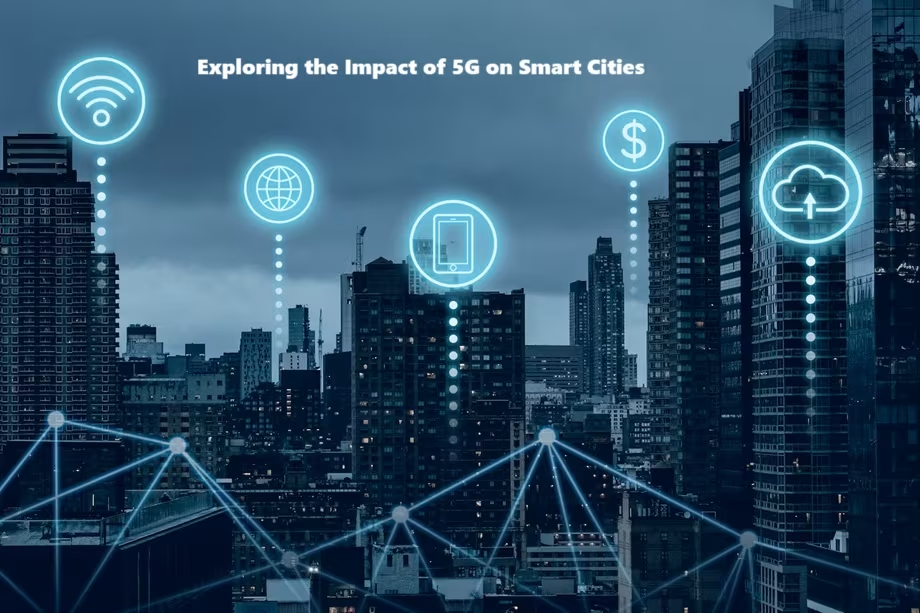The introduction of the 5G generation marks a contemporary breakthrough in the evolution of communication networks, offering extremely good tempo, reliability, and connectivity. As cities spherical the place come to be “smarter” via the combination of digital technology, 5G is poised to play a pivotal role in shaping the future of city living. This article explores the profound effect of 5G on smart cities, delving into how this next-generation network is remodeling city infrastructure, improving public offerings, and driving monetary growth.
What is 5G?
5G, or 5th-generation wireless technology, is the modern-day generation of cell networks, presenting significantly quicker data speeds, decreased latency, and the functionality to connect a splendid number of devices concurrently. Compared to its predecessor, 4G LTE, 5G can supply statistics at speeds of up to one hundred times quicker, with latency decreased to just a few milliseconds. This advanced performance allows real-time communication and enables the development of the Internet of Things (IoT), autonomous automobiles, and a notable superior era.
The Concept of Smart Cities
A clever metropolis leverages the digital generation to decorate the performance, sustainability, and extraordinary lifestyles for its residents. By integrating IoT gadgets, sensors, records analytics, and AI, smart towns purpose to optimize town services, which encompass transportation, energy manipulate, waste series, and public safety. The closing reason is to create an associated and practical city environment where assets are used more correctly, and offerings are introduced greater effectively, resulting in a higher quality of life for residents.
The Role of 5G in Smart Cities
5G is the backbone of smart cities, offering the high-speed, low-latency connectivity required to manage a large number of packages and offerings. The impact of 5G on smart cities can be determined along the path of numerous key areas:
1. Enhanced Connectivity and IoT Integration
One of the most awesome impacts of 5G on smart cities is its manual capacity, the massive deployment of IoT gadgets. These gadgets, which embody the entirety from clever sensors and cameras to associated automobiles and home equipment, generate top-notch quantities of data that need to be transmitted, processed, and analyzed in real-time. With 5G, towns can seamlessly be part of tens of millions of IoT devices, permitting extra green monitoring and management of city infrastructure.
For instance, 5 G-enabled sensors can display screen air exceptional, website visitors’ flow, and electricity consumption in real-time, permitting city officers to make data-driven decisions that improve public health, lessen congestion, and maintain energy. Additionally, the mixing of IoT devices in public utilities, together with water and electricity, can result in more experienced beneficial aid manipulation and reduced operational expenses.
2. Revolutionizing Public Transportation
Public transportation is an important detail of metropolis life, and 5G can revolutionize how human beings travel within towns. With its fantastically low latency and immoderate-tempo connectivity, 5G can be a useful resource for the development of impartial automobiles, which depend upon real-time records to navigate well and correctly. Smart cities can install fleets of 5 G-related self-driving buses, taxis, and shuttles, reducing visitor congestion, reducing emissions, and providing extra reachable transportation alternatives for residents.
Moreover, 5G can beautify the capability of the present public transportation systems. For example, real-time data from 5 G-linked sensors and cameras can optimize website online visitors’ signal timings, decreasing delays and improving the flow of buses and trams. Passengers can also benefit from 5 G-powered cell apps that provide real-time updates on transit schedules, automobile places, and provider disruptions, making their journeys more convenient and green.
3. Improving Public Safety and Emergency Response
Public protection is the other area where 5G ought to have a transformative impact. In smart towns, 5G can allow real-time communication among emergency responders, law enforcement, and town officers, making sure a quicker and additional coordinated reaction to incidents. For instance, 5 G-related drones prepared with cameras and sensors may be deployed to assess disaster sites, display big public events, or song criminal interest, offering stay video feeds and information to command centers.
Additionally, 5G can enhance the abilities of clever surveillance structures. With high-definition cameras and AI-powered analytics, towns can detect and respond to functionality threats more effectively, improving contemporary safety. In emergency conditions, 5 G-enabled wearables and mobile gadgets can provide first responders with essential fitness statistics, in conjunction with crucial signs and regional facts, letting them deliver targeted and timely care.
4. Advancing Smart Energy Management
Energy manipulation is a key awareness for smart towns, and 5G plays a vital role in advancing this area. With the capacity to connect a brilliant community of clever meters, sensors, and grid devices, 5G enables greater intelligent monitoring and control of energy consumption. For instance, smart grids can use 5G connectivity to balance deliver and demand in real-time, lowering power waste and lowering charges.
Furthermore, 5G can aid the integration of renewable energy assets, which include solar and wind, into the grid. By connecting allotted energy resources to a vital control gadget, towns can optimize their use of clean electricity, reducing their carbon footprint and contributing to environmental sustainability. In addition, 5 G-powered strength control structures can provide customers with real-time information on their strength usage, empowering them to make greater knowledgeable selections and reduce their intake.
5. Transforming Healthcare with Telemedicine
The healthcare location stands to benefit appreciably from the rollout of 5G in smart towns. Telemedicine, which permits patients to access medical care remotely, is one area where 5G might also have a profound effect. With its high-pace, low-latency connectivity, 5G permits real-time video consultations, far-flung tracking of patients, and the transmission of huge scientific files, collectively with high-resolution photos and diagnostic statistics.
In clever towns, 5G can also manage the deployment of related healthcare gadgets, which encompass wearable monitors and smart medical machines, which can constantly gather and transmit affected character data to healthcare companies. This real-time monitoring can lead to earlier detection of fitness troubles, more customized remedy plans, and better outcomes for patients. Additionally, 5G can facilitate the usage of AI in healthcare, allowing quicker and extra accurate diagnoses through the evaluation of large datasets.
6. Enabling Smart Buildings and Infrastructure
Smart houses are a vital part of clever cities, and 5G is fundamental to unlocking their full potential. These houses use a community of sensors, cameras, and IoT gadgets to expose and control numerous systems, which consist of lighting fixtures, heating, air flow, and safety. With 5G, those structures may be related to a treasured platform that optimizes their operation in real-time, leading to widespread energy financial financial savings, advanced comfort, and advanced protection.
For instance, 5 G-enabled smart houses can mechanically regulate lights and temperature primarily based on occupancy and climate conditions, reducing energy consumption and fees. Security structures can use AI-powered analytics to discover unusual interest and respond to functionality threats more rapidly. Additionally, 5G can guide the aggregate of smart building systems with city-wide infrastructure, enabling more efficient management of belongings and services.
7. Boosting Economic Growth and Innovation
The deployment of 5G in clever towns is expected to stress huge economic growth and innovation. By supplying the immoderate-pace connectivity had to help superior era, 5G can enchantment to groups and startups which can be developing new products and services. This, in turn, can create jobs, stimulate investment, and electricity economic development.
In addition to fostering innovation, 5G can also improve the productivity of the gift industries. For example, manufacturers can use 5G to attach machines, robots, and sensors on the production facility ground, allowing real-time tracking and optimization of production strategies. In the retail vicinity, 5G can assist the improvement of immersive buying memories, which include augmented reality (AR) becoming rooms and personalised advertising and advertising and marketing, using sales and consumer engagement.
8. Supporting Environmental Sustainability
Environmental sustainability is a critical focus for clever cities, and 5G can play a key role in helping their efforts. By permitting greater green control of sources, which incorporates power and water, 5G can assist towns reduce their environmental impact and achieve their sustainability goals.
For example, 5 G-related sensors can display water usage and encounter leaks in real-time, reducing waste and retaining this precious resource. In the transportation sector, 5G can manage the deployment of electric vehicles (EVs) and clever charging infrastructure, decreasing greenhouse gas emissions and enhancing air amazing. Additionally, 5G can permit greater green waste manipulate systems, which include smart containers that notify collection services even as they are full, lowering the frequency of waste collection and decreasing operational fees.
9. Challenges and Considerations
While the impact of 5G on smart cities is undeniably excessive, there are also demanding conditions and troubles that need to be addressed. One of the number one problems is the cost of deploying 5G infrastructure, which requires significant funding in new base stations, fiber optic networks, and high-quality tools. Cities need to cautiously consider a manner to finance these improvements and make certain that the benefits of 5G are allocated equitably at some point of all groups.
Another challenge is the ability to address cybersecurity dangers. With the proliferation of related devices and the full amount of information being transmitted over 5G networks, cities must put into effect sturdy cybersecurity measures to guard in opposition to cyberattacks and information breaches. This includes making an investment in superior encryption, authentication, and intrusion detection generation, as well as developing complete cybersecurity guidelines and protocols.
10. The Future of 5G in Smart Cities
As 5G rolls out globally, its impact on clever towns will simplest increase. In the approaching years, we’re capable of anticipating to appearance of even more superior programs of 5G in regions together with independent motors, a long way flung surgical treatment, and immersive leisure. The integration of 5G with rising generations like AI, blockchain, and part computing will similarly enhance the competencies of smart cities, main to new improvements and possibilities.




